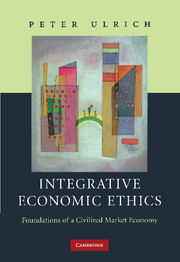Book contents
- Frontmatter
- Contents
- List of figures
- Preface
- Translator's note
- Introduction: orientation in economic-ethical thinking
- Part I Fundamental concepts of modern ethics and the approach of integrative economic ethics
- Part II Reflections on the foundations of economic ethics I: a critique of economism
- Part III Reflections on the foundations of economic ethics II: rational economic activity and the lifeworld
- 6 The question of meaning: economic activity and the good life
- 7 The question of legitimation: economic activity and the just social life
- Part IV A topology of economic ethics: the ‘sites’ of morality in economic life
- Bibliography
- Index of subjects
- Index of names
6 - The question of meaning: economic activity and the good life
Published online by Cambridge University Press: 22 September 2009
- Frontmatter
- Contents
- List of figures
- Preface
- Translator's note
- Introduction: orientation in economic-ethical thinking
- Part I Fundamental concepts of modern ethics and the approach of integrative economic ethics
- Part II Reflections on the foundations of economic ethics I: a critique of economism
- Part III Reflections on the foundations of economic ethics II: rational economic activity and the lifeworld
- 6 The question of meaning: economic activity and the good life
- 7 The question of legitimation: economic activity and the just social life
- Part IV A topology of economic ethics: the ‘sites’ of morality in economic life
- Bibliography
- Index of subjects
- Index of names
Summary
Ultimately, man should not ask what the meaning of his life is, but rather must recognize that it is he who is asked. In a word, each man is questioned by life; and he can only answer to life by answering for his own life; to life he can only respond by being responsible.
Meaning must be understood as a fundamental category of human existence. Man is a being in search of meaning, and what is more, he possesses a ‘will to meaning’ founded on his essential freedom of action and the consequent possibility and necessity of intentional (deliberate) self-determination. We can, therefore, speak of an ‘apriori of meaning orientation on the basis of the teleological nature of man’ as a part of the universal conditio humana. Without a meaning context human life is impossible. Meaning fills human existence with significance by directing our existence towards what is essential in life, namely what we wish for in life as a whole. The truly strong motives which determine our strivings and aspirations in life are rooted in our teleological meaning structures. What we wish to make of our lives, what we expect from life, whether we are satisfied with what we achieve so that we ‘feel good’ about our lives or not depends on them.
- Type
- Chapter
- Information
- Integrative Economic EthicsFoundations of a Civilized Market Economy, pp. 189 - 215Publisher: Cambridge University PressPrint publication year: 2008

